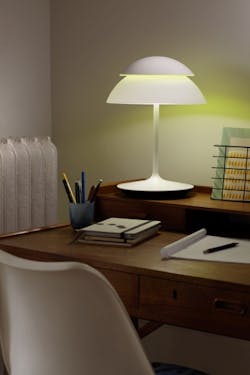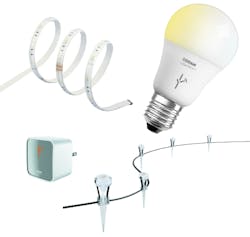Connected Lighting Alliance hosts a multi-vendor ZigBee LED lighting demo at CES
Major players in lighting and controls, including Philips Lighting, Osram Sylvania, GE Lighting, Lutron, LG Electronics, and Leedarson, show interoperable SSL products at the mammoth Consumer Electronics Show.
The Connected Lighting Alliance, an advocacy organization backed by leading companies in the lighting industry, has announced an International Consumer Electronics Show (CES) demonstration that will showcase the interoperability of products based on the ZigBee Light Link standard. Indeed, Philips Lighting, Osram Sylvania, GE Lighting, Lutron, LG Electronics, and Leedarson supplied products, including LED lamps and luminaires, that seamlessly work together on one wireless ZigBee network, and such interoperability could be the key to broader deployment of networked LED lighting systems, especially in the residential market.
Formed to help proliferate networked solid-state lighting (SSL) and smart lighting applications, The Connected Lighting Alliance selected ZigBee Light Link as the standard of choice for wireless connectivity and control in residential applications back in 2013. Zigbee Light Link was published back in 2012 by the ZigBee Alliance adding lighting-specific control and commissioning capabilities layered on top of the standards that define baseline ZigBee wireless networks. It includes a definition of the wireless network and the protocol that allows a plug-and-play approach to linking, say, a dimmer control with a lamp or fixture.
We have seen most of the networked LED lighting products included in the CES demonstration introduced to the market over the past year to 18 months, although the manufacturers behind the products have rarely discussed interoperability. Still, the fact that a manufacturer chose the Light Link standard would imply the intention of supporting multi-vendor installations of SSL products.
"We are excited to see the smart lighting market entering the next phase of evolution," said Simon den Uijl, secretary general of The Connected Lighting Alliance. "The products shown at CES indicate the market is converging to a common wireless communication protocol, which will boost consumer confidence."
The CES demonstration also showed a ZigBee-based Lutron control product for the first time — a wireless remote control in the company's Pico family. Lutron has long been a member of the Zigbee Alliance and The Connected Lighting Alliance. But the company has also championed its proprietary Clear Connect wireless network. The ZigBee-based Pico product has not been formally introduced to market, but den Uijl said, "The prerequisite for participating in the demo is for the products to be ZigBee certified, and therefore already on the market or soon to be introduced on the market."
Other products in the demo include the Philips color-tunable Hue lamps, luminaires, and strips that are perhaps the best-known and most-widely-sold wireless SSL products on the market. Sylvania's products also include models in the Lightify family with tunable color capabilities as well as white lighting products.
GE Lighting had entered the ZigBee-based market back in the summer of 2014 with the dimmable white Link LED lamps. In that announcement, GE brought ZigBee-based lamps well under the $20 price point for the first time.
Leedarson, meanwhile, offers a family of ZigBee-based products including networked LED lamps, ZigBee hubs, ZigBee-controlled AC sockets, SSL luminaires, and remote controls. The company supplied A19 lamps for the CES demo. LG Electronics also supplied A19 lamps for the demo after showing such products for the first time at the Light+Building trade fair back in the spring of 2014.

Maury Wright | Editor in Chief
Maury Wright is an electronics engineer turned technology journalist, who has focused specifically on the LED & Lighting industry for the past decade. Wright first wrote for LEDs Magazine as a contractor in 2010, and took over as Editor-in-Chief in 2012. He has broad experience in technology areas ranging from microprocessors to digital media to wireless networks that he gained over 30 years in the trade press. Wright has experience running global editorial operations, such as during his tenure as worldwide editorial director of EDN Magazine, and has been instrumental in launching publication websites going back to the earliest days of the Internet. Wright has won numerous industry awards, including multiple ASBPE national awards for B2B journalism excellence, and has received finalist recognition for LEDs Magazine in the FOLIO Eddie Awards. He received a BS in electrical engineering from Auburn University.






